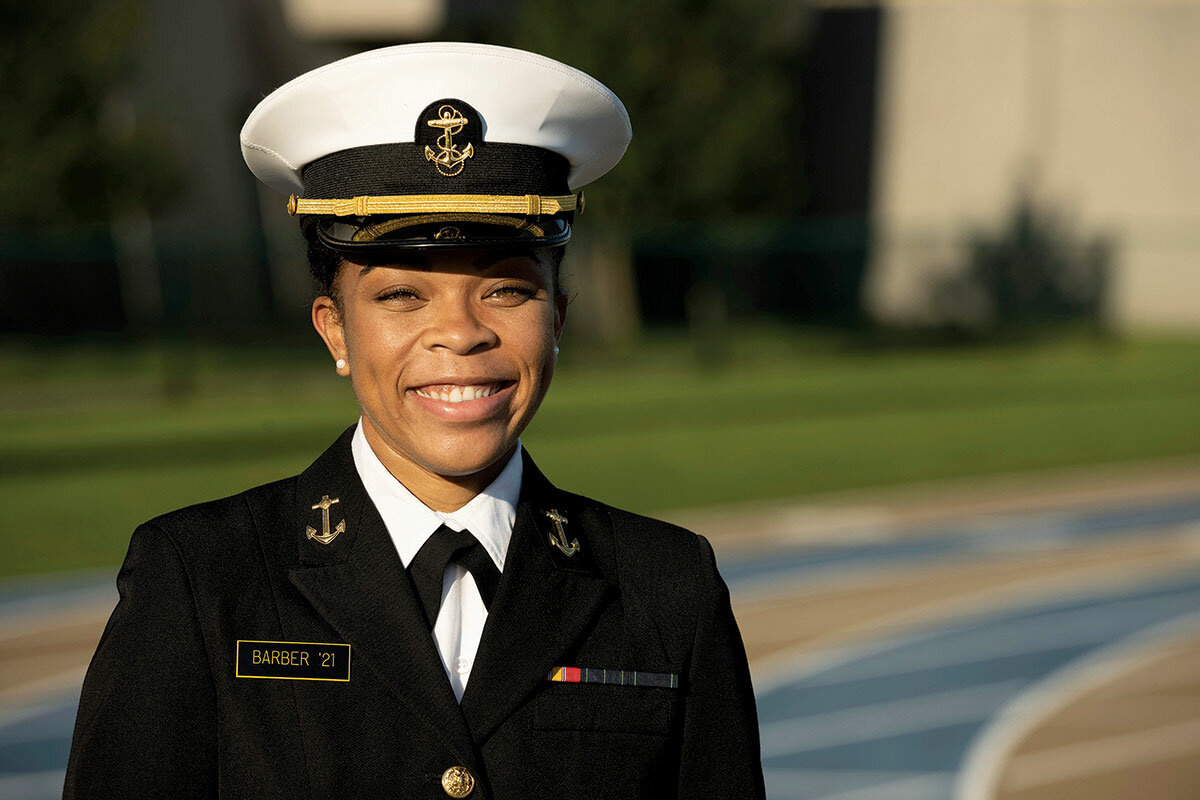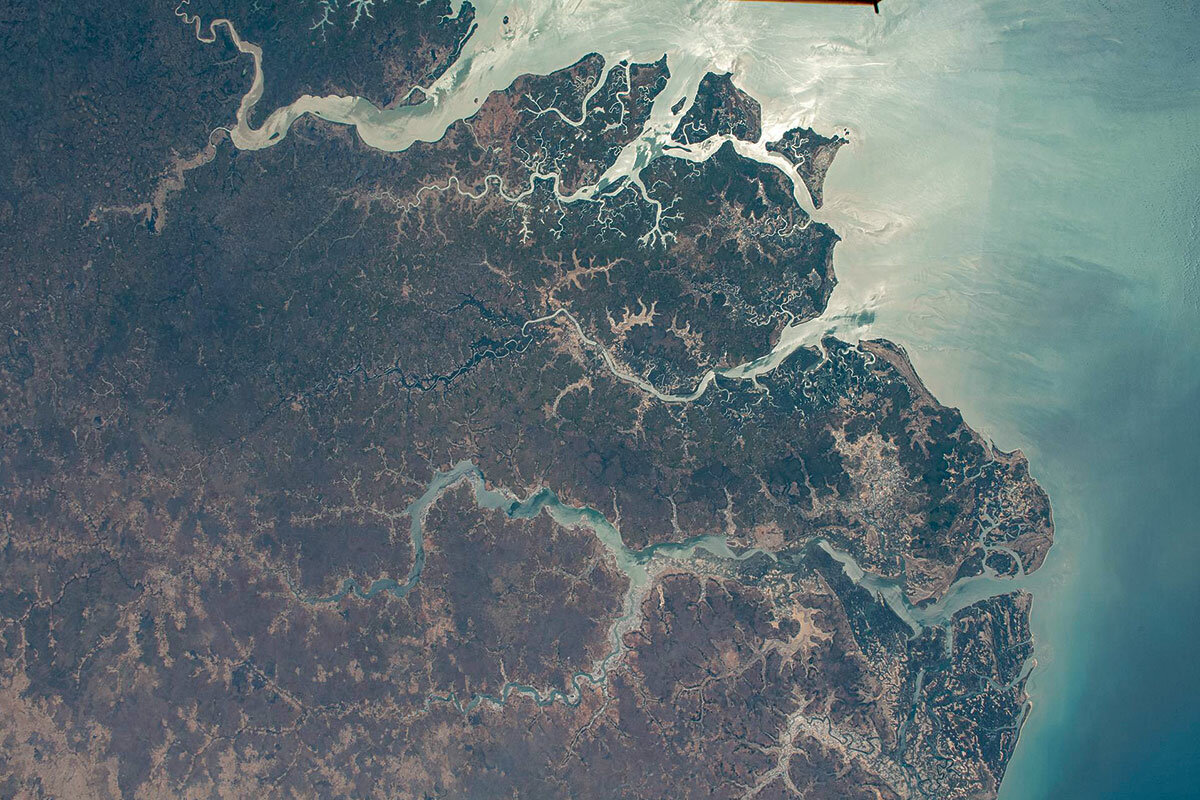Points of Progress: Solar power use boosts teacher pay, and more
Loading...
1. United States
In the spring, Midshipman Sydney Barber will become the first Black woman to serve as brigade commander – the highest post for a midshipman – at the U.S. Naval Academy in Maryland. In the nearly five decades that women have been allowed to attend the academy, only 15 others have achieved this rank. One colleague calls the mechanical engineering major and track team member a “catalyst for action, a visionary, a listener, a doer, and a person driven by compassion.”
Midshipman Barber says she looks forward to continuing to break glass ceilings and making her family proud. When talking to NPR about her great-grandparents, who were sharecroppers on a Mississippi plantation, Ms. Barber said, “They would never even picture this moment. This America looks nothing like the America that they experienced. ... I always take that to heart.” (NPR, Yahoo News)
Why We Wrote This
This is more than feel-good news – it's where the world is making concrete progress. A roundup of positive stories to inspire you.
2. United States
A school district in Arkansas has joined the thousands of educational institutions across the country embracing solar energy – and it’s using savings to boost teachers’ pay. The Batesville School District used to operate on a $250,000 budget deficit and struggled to retain teachers. During a 2017 audit, school leaders discovered the annual utility bill was more than $600,000. By installing solar panels and updating the facilities to be more energy efficient, the schools cut their yearly energy consumption by 1.6 million kilowatts and are on track to save $2.4 million over 20 years. That’s translated into raises averaging $2,000-$3,000 per educator. Batesville was able to secure a $5.4 million bond to make the updates, but in 2019, Arkansas passed legislation designed to support other districts making a similar switch. (Energy News)
3. Costa Rica
Costa Rica affirmed its commitment to combating modern slavery by signing a 2014 United Nations treaty, which requires states to identify, rescue, and compensate victims of forced labor and punish human traffickers. In 2017 the U.N. estimated 40 million people are in forced labor and forced marriages, including 6,000 people in Costa Rica. Traffickers often target women, children, and migrants, who can be sold for sex or trapped in agricultural or domestic servitude. The U.N. International Labor Organization says Costa Rica is the fifth country in Latin America and the Caribbean to sign the treaty, and it brings the U.N. closer to its goal of ending modern slavery in the next decade. (Thomson Reuters Foundation)
4. Pakistan
A new project in Karachi is creating a cleaner and more inclusive city by establishing the nation’s first privately managed public restrooms. The social welfare group behind the initiative, the Salman Sufi Foundation, says its focus is on the safety of women, people with disabilities, and the transgender community. About 40% of Pakistan’s population lack access to decent toilets, according to the charity WaterAid, and previous efforts by the government to maintain functional restrooms have been stymied by restrictive city budgets. Under the new approach, the Salman Sufi Foundation has been able to build each wheelchair-accessible bathroom out of old shipping containers for $12,700. The facilities are well lit and ventilated, and also include baby-changing stations. Mohammad Hanif works in a cargo office near the group’s inaugural toilet, and said that it’s a huge improvement: “I had little choice but to use the stinky and perpetually wet public toilet a little further away from here. This one is like using a five-star facility.” (Thomson Reuters Foundation)
5. New Zealand
New Zealand Police has added the hijab to its official uniform options – a move the police force hopes will help officers better reflect the country’s diversity and encourage more Muslim women to join the force. Police officials say they began developing a uniform hijab in 2018, and new recruit Constable Zeena Ali will be the first to don the garment. She also had a hand in designing the hijab. Constable Ali says she decided to join the force after the Christchurch shooting in 2019 that killed 51 people and injured 40 who were worshipping in two mosques. “I realized more Muslim women were needed in the police, to go and support people,” she told the New Zealand Herald. “It feels great to be able to go out and show the New Zealand Police hijab as part of my uniform.” (BBC, The New Zealand Herald)
Outer space
For the first time, NASA has used supercomputers and AI technology to map nonforest trees from outer space. The international team of scientists surveyed 500,000 square miles in dryland regions, including the Sahara’s arid south, discovering billions of trees in just a few weeks. Traditional methods of mapping trees growing outside forest boundaries could have taken years to produce the kind of data NASA’s team was looking for.
Their findings mark the first in a series of studies to determine how much carbon nonforest trees store. “There are important ecological processes, not only inside, but outside forests, too,” said Jesse Meyer, a programmer at NASA’s Goddard Space Flight Center in Greenbelt, Maryland. “For preservation, restoration, climate change, and other purposes, data like these are very important to establish a baseline.” (SciTechNews)










